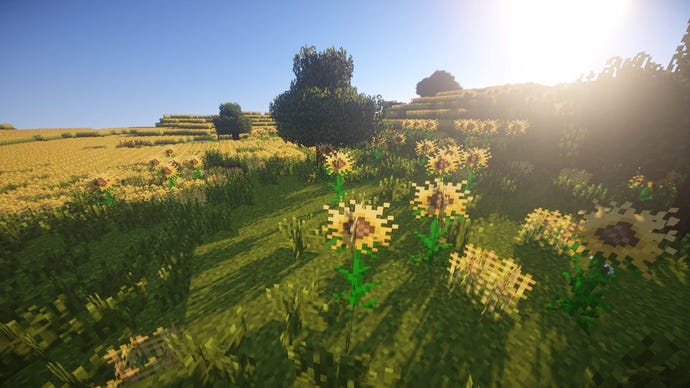USgamer Community Question: Which Game do You Wish You'd Designed?
If you could have designed any game in history, which one would you choose?
This article first appeared on USgamer, a partner publication of VG247. Some content, such as this article, has been migrated to VG247 for posterity after USgamer's closure - but it has not been edited or further vetted by the VG247 team.
This week's question is all about wishful thinking. Of all the games you've played, which one do you wish you had designed yourself? Perhaps it's a classic RPG that involves interesting characters and complex control systems, or maybe it's a best-selling game that would have made you rich? Either way, it's a game that you think is so good, you wish you could put your name on it.
Given the same choice, these are the titles that the USgamer team wish they'd designed themselves.
Jeremy Parish, Editor-in-Chief
I'm not much of a Minecraft enthusiast. You need a lot more free time than I have in order to get the most out of that particular game! Still, I wish I'd come up with the idea. Not because it would have made me rich (though I'd certainly have bought something more interesting than a mansion full of candy with my Minecraft billions), but because it's one of those, "Oh, of course" ideas that everyone tried to do for years without success, yet which seems deviously simple in hindsight.
Our tale begins 20 years ago: I spent the summer of 1996 at a summer university program in Prague. During the month that I lived there, I frequently hung out at the Globe, which in those days (immediately following the end of the Czech Republic's Soviet domination) was the city's first and only English-language bookstore. On one of those afternoon forays, I picked up a novel by Douglas Copland called Microserfs.
Like most of Copland's novels, Microserfs centered around socially malfunctioning people attempting to navigate contemporary technology and pop culture, so it's aged terribly. But the driving hook of the plot, in which a group of tech geeks leave their comfortable careers to build a startup and create what amounts to a virtual LEGO set, presented an idea that Minecraft only managed to bring to life a decade and a half after the novel's publication date. There were other LEGO apps before Minecraft, but none of them were interesting, intuitive, or enjoyable. Minecraft cracked the code and made the dream of Microserfs a reality.
That Minecraft's creator eventually sold his game and his company to Microsoft — the company the Microserfs team broke from at the beginning of the novel — is a matter of no small irony.
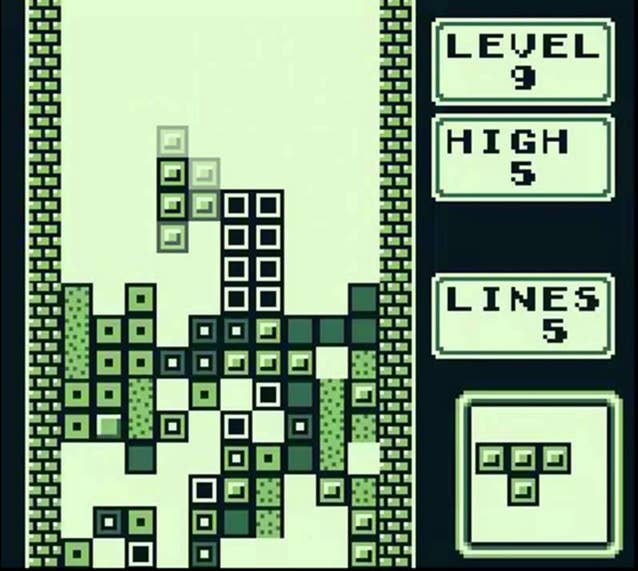
Jaz Rignall, Editor-at-Large
Since the question doesn't specifically say "video game", the first answer that immediately leaps to mind is Magic the Gathering. I've absolutely loved Wizards of the Coast's phenomenal collectible trading card game ever since I first learned how to play it in 1994. Indeed, I'd go so far to say it's the greatest game ever designed - even better than chess. It just has the perfect balance of strategy, bluffing, skill, and a little bit of luck, and I never get tired of playing it.
But since we're a video gaming site, I feel I'm cheating by choosing a card game, so my second choice would be one of the most popular video games of all time - and that's Tetris. Designed on a cold war era Soviet computer, the game is incredibly simple, but is one of the most addictive pieces of entertainment software ever devised. I remember seeing Andromeda Software/Mirrorsoft's Commodore 64 version for the first time in late 1987. Initially, it didn't look like much, but once I started to play it, I had a true choir-of-angels moment of revelation when I figured out how it worked - and that was it. I was utterly hooked on the game, and played it for hours on end, late into the night. Indeed, when I reviewed the game, I called it "one of the all-time computer classics," and I still stand by that today.
Since then, the game has appeared on just about every platform imaginable, making it one of the most-ported games of all time. As a video game designer, you couldn't ask for a better legacy than that.
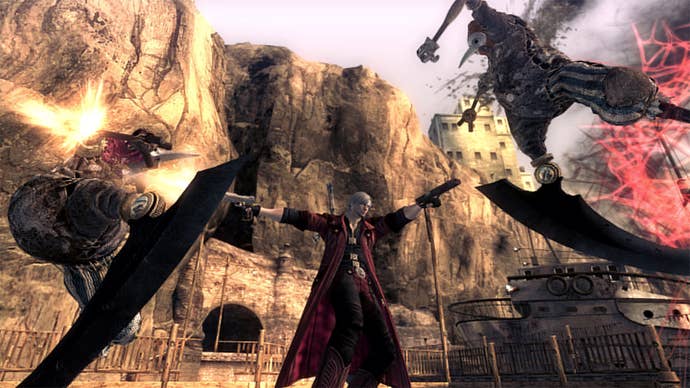
Mike Williams, Associate Editor
My first thought was Resident Evil 4, but instead, I think I'm going with the game that was supposed to be Resident Evil 4. Early in its lifespan, Devil May Cry was conceived as the next Resident Evil title, before the development team - including director Hideki Kamiya - decided that it wouldn't fit within the franchise. That was probably the right choice as the "stylish hard action" went out to carve out its own genre and is essentially what Kamiya's current company, Platinum Games, relies on for many of their titles.
Attaching my name to Platinum is probably closer to what I want, but without Devil May Cry, I don't think there'd be a Platinum Games. Realize DMC was one of the first 3D title that really got into and captured that pinpoint action gameplay found in some of the best 2D action games. The focus on combos and grades pushed players to get better: string together more weapons, tighten up their dodge game, and truly master the game's systems.
Combined with the magnificent B-grade hamminess of Dante and Devil May Cry was a class act. Everything around Dante is serious, but it's like he's from a completely different game. Put a more serious protagonist in DMC and I don't think the game would hit as hard. Put Dante in a game with a similar tone and I feel he would've been forgotten. That juxtaposition is the best part.
Devil May Cry went on to inspire games like God Hand, Bayonetta, Ninja Gaiden, and Darksiders, which is good company to be in. Not every sequel has been great, but they've been worth playing and DMC's descendants have done well for themselves. If I could attach my name to anything, it'd be Devil May Cry.

Kat Bailey, Senior Editor
I'm going to say Stardew Valley, but maybe not for the reason you might expect. For me, making a game is what you might call an aspirational thing. I really want to just sit down and make a game. I look at a game like Stardew Valley - which began life as a fan alternative to Harvest Moon, and I think to myself, "I could have made that." Okay, that's probably not giving Stardew Valley enough credit. But with the powerful tools available now, it's easier than ever to sit down and make a game.
But of course, games don't happen overnight. There's a huge amount of text to write, characters to design, art to acquire, and mechanics to work out. But then, I look at what Moppin managed to do with Downwell, and it doesn't seem so daunting after all. So I guess what I'm saying that is that what really needs to happen is that I need to suck it up and actually start making something. But that's the trick, isn't it?
Anyway, this response sort of goes against the spirit of the question, but it's something that's been on my mind for a while now. I hope someday I will receive a scathing game review of my very own. I will know that I've truly arrived.
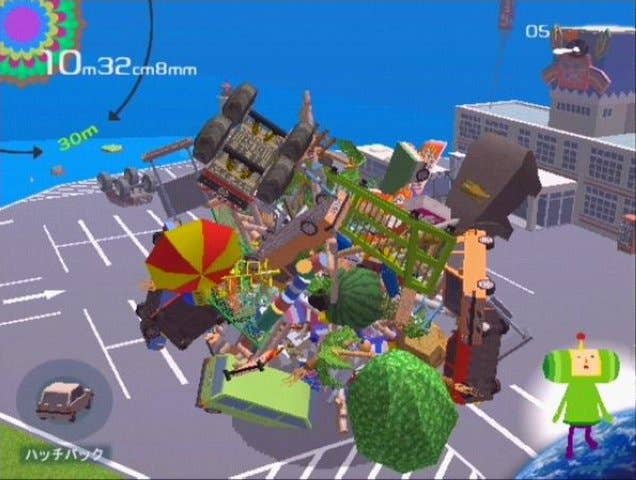
Bob Mackey, Senior Writer
If only we could all be as brilliant as the great Keita Takahashi, that whimsical, humble man who was simply too much of an artist to subject himself to the grind of the traditional video game industry. Even so, he emerged from nowhere and stuck around long enough to give us both Katamari Damacy and We Love Katamari, two games that will forever remain timeless classics—even if Bandai-Namco isn't particularly interested in giving us any way to play them on modern platforms. And while I don't quite believe in auteur theory as much as I used to, the first Katamari games feel like they come from a singular vision: The graphics, music, play, and narrative all work in concert to bring said vision to life.
Few people get the chance to bring such an odd, unique idea to life under the control of a major publisher, so I'd consider myself very fortunate to be in Takahashi's place when we made those games over a decade ago. Unfortunately, as of now, my game development history isn't quite as esteemed—but if you're in the market for a bunch of unfinished Duke Nukem 3D maps, I'm your dude.
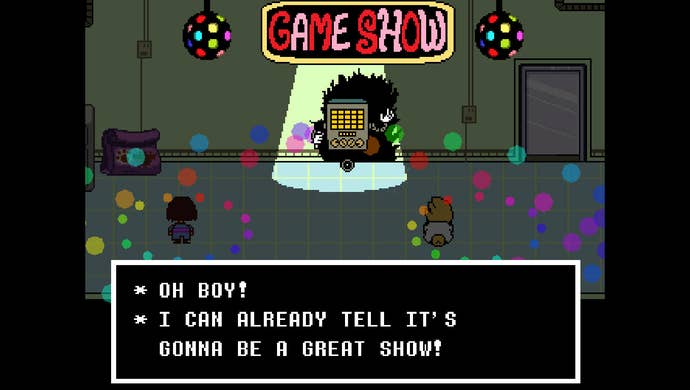
Nadia Oxford, Staff Writer
Toby Fox made Undertale, one of 2015’s most critically-acclaimed titles, with Game Maker Studio, an “Anyone Can Program!(TM)”-style template that proves the best games don’t necessarily have to be birthed through enormous teams equipped with gobs of money. Nevertheless, even a game made via a template requires a dash of unique thinking in order to become something super-special, and Undertale’s various save file tricks definitely count as special, at least in my book. They make an indelible mark on your mind if you’re easily haunted by bad dreams, and / or get spooked when games go outside their protocol.
Undertale is mainly celebrated for its music and interesting moral system, but if I had any particular desire to make games (I currently don’t, though I would never say “no” to a related localization or writing job), I’d definitely want to be responsible for a game in the vein of Undertale -- something that challenges the basic order of game narrative, then bullets through the fourth wall to Hurricane-kick your expectations for how game hardware and software should function. I want to make character that only exist deep within the game’s code, like Undertale’s haunting Dr Gaster. I want to unsettle people and make them remember how freaky it was when their NES would suddenly seize up on them for no good reason.
It appears I may have a problem.
